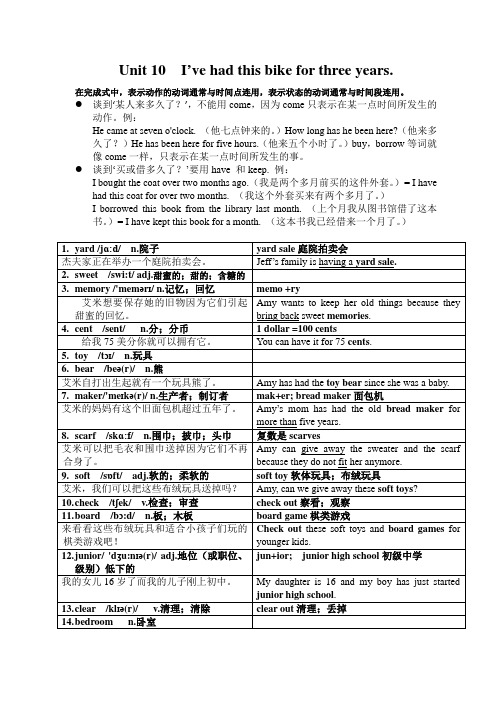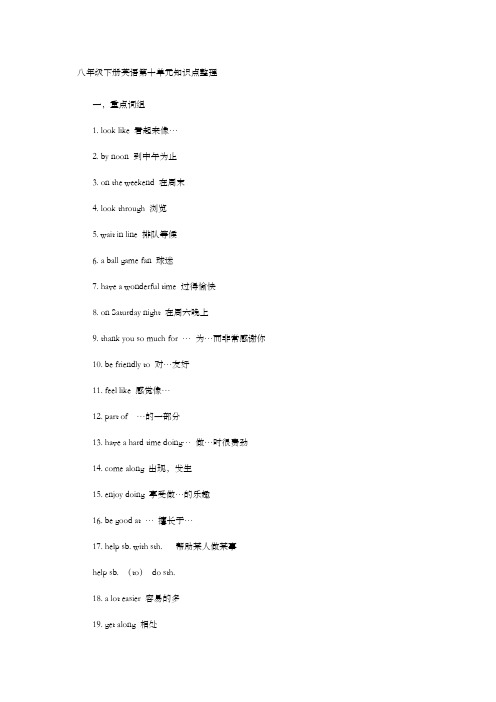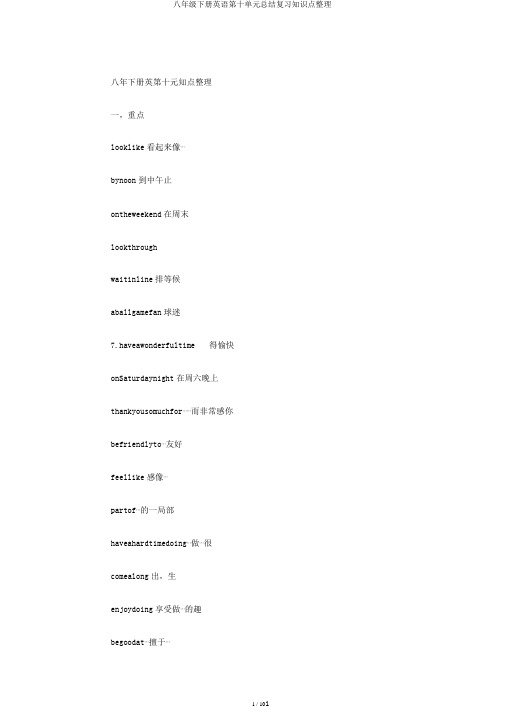八年级下册英语第十单元知识点整理上课讲义
完整版人教版英语八年级下册unit10知识点总结

完整版人教版英语八年级下册unit10知识点总结完整版人教版英语八年级下册Unit 10知识点总结Unit 10 of the complete edition of the People's Education Press English textbook for eighth grade covers various topics related to travel and tourism. This unit introduces new vocabulary, grammar concepts, and practical language skills that are useful for students in their daily conversations and written expressions. Below is a comprehensive summary of the key points covered in this unit.1. Vocabulary:- Words and phrases related to travel: journey, trip, travel, tourist, guide, accommodation, sightseeing, etc.- Words related to transportation: flight, train, bus, ship, subway, taxi, etc.- Words related to tourist attractions: museum, park, zoo, beach, mountain, etc.2. Grammar:- Present continuous tense: Used to talk about actions happening at the moment of speaking or temporary situations. Formed by using the present tense of "be" (am, is, are) + verb (-ing).- Examples:- I am traveling to Beijing next week.- They are visiting the Great Wall of China.- We are staying at a hotel near the beach.- Comparative and superlative forms: Used to compare two or more things. "Comparative" is used to compare two things, while "superlative" is used to compare three or more things.- Examples:- The Eiffel Tower is taller than the Statue of Liberty.- Mount Everest is the highest mountain in the world.- Prepositions of place: Used to indicate the location or position of something. Common prepositions of place include in, on, at, under, behind, etc.- Examples:- The car is parked in front of the building.- The book is on the table.- The cat is hiding behind the sofa.3. Reading and Listening Skills:- Understanding and answering questions about travel brochures, advertisements, and itineraries.- Listening to dialogues and conversations related to travel plans, transportation, and directions.4. Writing Skills:- Writing a travel diary or a blog post about a recent trip. Includes describing the destination, activities, and personal experiences.- Writing a postcard or letter to a friend, sharing details about a visited place and expressing thoughts and feelings.5. Speaking Skills:- Role-playing dialogues about making travel plans, booking accommodations, asking for directions, etc.- Group discussions on favorite tourist attractions, dream travel destinations, and travel experiences.6. Cultural Knowledge:- Learning about famous tourist attractions around the world.- Exploring different customs and traditions in various travel destinations.By studying and mastering the knowledge points in Unit 10, students will be able to effectively communicate and express themselves in English when discussing travel-related topics. Practice and application of these points will enhance students' language proficiency and broaden their understanding of the world.。
人教版八年级下册英语Unit 10 知识点语法归纳总结

Unit 10 I’ve had this bike for three years.1.短语归纳2.典句必背3.用法集萃(1)How long have you had that bike over there? 你买那边的那辆自行车多长时间了?❖本句是how long引导的特殊疑问句,时态是现在完成时,结构是“How long+have/has+主语+过去分词+其他?”。
how long表示“多长时间”,对时间段进行提问。
例:—How long have you lived in Beijing?—For ten years. 十年了。
辨析:how often, how soon, how long, how far(2)Because I’ve had it since I was a baby. 因为我还是个婴儿的时候就拥有它了。
❖since是连词,意为“自从;...以来”,引导时间状语从句,从句多用一般过去时,主句多用现在完成时。
例:He has skated for quite some time since we came here. 自从我们来到这儿,他已经滑冰很长时间了。
She has been living a hard life since her husband died. 自从她丈夫死后,她一直过着艰苦的生活。
❖拓展since还可以用作介词,后接名词或名词短语。
例:He’s been off work since Tuesday. 自星期二以来他一直没上班。
(3)For example, he has owned a train and railway set since his fourth birthday, and he played with italmost every week until he was about seven.比如,他从四岁生日起就拥有了火车和铁路套装玩具,他几乎每个星期都玩儿它,直到他七岁左右。
八年级下册英语第十单元知识点整理

八年级下册英语第十单元知识点整理第一篇:八年级下册英语第十单元知识点整理八年级下册英语第十单元知识点整理一,重点词组1.look like 看起来像…2.by noon 到中午为止3.on the weekend 在周末4.look through 浏览5.wait in line 排队等候6.a ball game fan 球迷7.have a wonderful time 过得愉快8.on Saturday night 在周六晚上9.thank you so much for … 为…而非常感谢你10.be friendly to 对…友好11.feel like 感觉像…12.part of …的一部分13.have a hard time doing… 做…时很费劲e along 出现,发生15.enjoy doing 享受做…的乐趣16.be good at … 擅长于…17.help sb.with sth.帮助某人做某事help sb.(to)do sth.18.a lot easier 容易的多19.get along 相处20.be careful to do sth.小心去做某事21.at least 至少22.at this time 此时二,交际用语1.It's a nice day, isn't it? 今天是个好天气,不是吗?Yes, it is.是。
2.You're Ben's sister, aren't you? 你是本的姐姐/妹妹,对吗?Yes, I am.是的,我是。
3.You love violin music, don't you? 你喜欢小提琴乐曲,对吗?Yes, I do.是的,我喜欢。
三,重点难点释义1.I hope so.我希望如此。
此处so 是副词,意为“如此”“如是”.如-Our team will win.我们队会赢的。
Unit 10知识点讲解人教版英语八年级下册

Unit 10 I’ve had this bike for three years.
在完成式中,表示动作的动词通常与时间点连用,表示状态的动词通常与时间段连用。
●谈到‘某人来多久了?’,不能用come,因为come只表示在某一点时间所发生的
动作。
例:
He came at seven o'clock. (他七点钟来的。
)How long has he been here?(他来多久了?)He has been here for five hours.(他来五个小时了。
)buy,borrow等词就像come一样,只表示在某一点时间所发生的事。
●谈到‘买或借多久了?’要用have 和keep. 例:
I bought the coat over two months ago.(我是两个多月前买的这件外套。
)= I have
had this coat for over two months. (我这个外套买来有两个多月了。
)
I borrowed this book from the library last month. (上个月我从图书馆借了这本
书。
)= I have kept this book for a month. (这本书我已经借来一个月了。
)。
Unit 10 单元知识点总结课件-八年级英语下册(人教版)

make friends be friends
go out be out
finish be over
Get to/arrive/ reach be in
leave be away(from) join be a member of/ be in
come/ go 相应的介词短语
瞬间动词 (组)转换为 “be+ adj./ adv./prep./
01
1. 现在完成时用法总结 • 表影响:动作发生在过去并且对现在造成影响
I have already finished my homework.
• 表持续:动作发生在过去持续到现在(谓语动词必须时延续性动词)
I have kept the book since 5 days ago.
2.瞬间Vs. 延续性动词
01 How long
询问物体长度 “多长”
回答:It’s + 长度;About+长度
—— How long is the river? —— It’s About 500 kilometers.
询问时间长度 “多长时间”
回答:for+时间段(for常省略); since+过去时间点/ 时间段+ago/过去时间状语
表示能够延续的动作或状态
• 常与表示时间段的状语连用 延
(for+一段时间, since+从句/时间 续
点, how long)
性
动
• 常见延续性动词
词
learn, read, work, walk, wait…
I have waited for 2 hours.
表示动作是瞬间完成的
八年级下册英语第十单元知识点整理

八年级下册英语第十单元知识点整理一,重点词组1. look like 看起来像…2. by noon 到中午为止3. on the weekend 在周末4. look through 浏览5. wait in line 排队等候6. a ball game fan 球迷7. have a wonderful time 过得愉快8. on Saturday night 在周六晚上9. thank you so much for …为…而非常感谢你10. be friendly to 对…友好11. feel like 感觉像…12. part of …的一部分13. have a hard time doing…做…时很费劲14. come along 出现,发生15. enjoy doing 享受做…的乐趣16. be good at …擅长于…17. help sb. with sth. 帮助某人做某事help sb. (to)do sth.18. a lot easier 容易的多19. get along 相处20. be careful to do sth. 小心去做某事21. at least 至少22. at this time 此时二,交际用语1. It's a nice day, isn't it? 今天是个好天气,不是吗?Yes, it is. 是。
2. You're Ben's sister, aren't you? 你是本的姐姐/妹妹,对吗?Yes, I am. 是的,我是。
3. You love violin music, don't you? 你喜欢小提琴乐曲,对吗?Yes, I do. 是的,我喜欢。
三,重点难点释义1. I hope so. 我希望如此。
此处so 是副词,意为“如此”“如是”.如-Our team will win. 我们队会赢的。
八年级下册英语第十单元总结复习知识点整理

八年下册英第十元知点整理一,重点looklike看起来像⋯bynoon到中午止ontheweekend在周末lookthroughwaitinline排等候aballgamefan球迷7.haveawonderfultime 得愉快onSaturdaynight在周六晚上thankyousomuchfor⋯⋯而非常感你befriendlyto⋯友好feellike感像⋯partof⋯的一局部haveahardtimedoing⋯做⋯很comealong出,生enjoydoing享受做⋯的趣begoodat⋯擅于⋯helpsb.withsth.帮助某人做某事helpsb.〔to〕dosth.18.aloteasier容易的多19.getalong相becarefultodosth.小心去做某事atleast至少atthistime此二,交用It'saniceday,isn'tit今天是个好天气,不是Yes,itis.是。
You'reBen'ssister,aren'tyou你是本的姐姐/妹妹,Yes,Iam是.的,我是。
Youloveviolinmusic,don'tyou你喜小提琴曲,Yes,Ido.是的,我喜。
三,重点点Ihopeso.我希望如此。
此so是副,意“如此〞“如是〞.如-Ourteamwillwin. 我会的。
-Ihopeso.我希望如此。
by不于;在什么⋯⋯之前Doyouthinkit'llstopbynoon 你中午之前雨会停Ihopethebuscomessoon.我希望汽快点儿来。
hope的从句中,既可以用一般将来表示将来,也可以用一般在表示将来,如本句。
lookthrough;翻;看一遍Lookthroughthisplanforme,andtellmewhatyouthinkofit. 替我看一遍划,并把你的想法告我。
最全面人教版八年级下册英语第十单元知识点归纳总结

Unit 10 I've had this bike for three years.一、词汇与短语◆重点单词A部分1.yard 院子n.2.junior 地位(或职位、级别)低下的adj. 3.sweet 甜蜜的;甜的;含糖的adj.4.clear 清理;清除v.5.memory 记忆;回忆n.6.bedroom 卧室n.7.cent 分;分币n.8.own 拥有;有v.9.toy 玩具n.10.railway 铁路;铁道n.11.bear 熊n.12.part 离开;分开v.13.maker 生产者;制订者n.14.certain 某种;某事;某人adj. 15.scarf 围巾;披巾;头巾n.16.honest 诚实的;老实的adj. 17.soft 软的;柔软的adj.18.while 一段时间;一会儿n. 19.check 检查;审査v. & n.20.truthful 诚实的;真实的adj. 21.board 板;木板n.22.hometown 家乡;故乡n.B部分1.nowadays 现今;现在;目前adv.2.century 百年;世纪n.3.search 搜索;搜査v. & n.4.especially 尤其;特别;格外adv. 5.among 在(其)中;……之一prep.6.childhood 童年;幼年n. 7.crayon 彩色铅笔(或粉笔、蜡笔) n.8.consider 注视;仔细考虑v. 9.shame 羞耻;羞愧;惭愧n.10.hold 拥有;抓住v.11.regard 将…认为;把…视为;看待v.12.count 数数v.13.opposite 与…相对;在…对面prep. 对面的;另一边的adj.◆重点短语A部分1.yard sales 庭院拍卖会2.to be honest 说实在的3.give sth. away to……把某物捐赠给……4.in need 需要5.soft toys 软体玩具;布绒玩具6.bread makers 面包机7.check out 察看;观察8.not……anymore 不再……9.junior high school 初级中学10.a couple of months 几个月11.board games棋类游戏12.for a long time 好长时间13.clear out清理;丢掉14.grow up fast 长得快15.no longer 不再;不复16.decide to do sth. 决定做某事17.part with 放弃,交出(尤指不舍得的东西)18.for a while 一会儿19.as for 至于;关于B部分1.according to 依据;按照2.search for work 找工作3.close to 几乎;接近4.with great interest 带着极大的兴趣5.hometown feelings 家乡情6.be true of…对…适用,符合于…7.some…others…一些…另一些…8.be interested in…对…感兴趣9.millions of 数百万的10.in order to…为了…◆重点句子A部分1.—How long have you had that bike over there?那边的那辆自行车你买了多长时间了?—I've had it for three years! 我买了三年了!2.We have decided to each sell five things that we no longer use.我们决定每人卖掉5件不再用的东西。
- 1、下载文档前请自行甄别文档内容的完整性,平台不提供额外的编辑、内容补充、找答案等附加服务。
- 2、"仅部分预览"的文档,不可在线预览部分如存在完整性等问题,可反馈申请退款(可完整预览的文档不适用该条件!)。
- 3、如文档侵犯您的权益,请联系客服反馈,我们会尽快为您处理(人工客服工作时间:9:00-18:30)。
八年级下册英语第十单元知识点整理
一,重点词组
1. look like 看起来像…
2. by noon 到中午为止
3. on the weekend 在周末
4. look through 浏览
5. wait in line 排队等候
6. a ball game fan 球迷
7. have a wonderful time 过得愉快
8. on Saturday night 在周六晚上
9. thank you so much for …为…而非常感谢你
10. be friendly to 对…友好
11. feel like 感觉像…
12. part of …的一部分
13. have a hard time doing…做…时很费劲
14. come along 出现,发生
15. enjoy doing 享受做…的乐趣
16. be good at …擅长于…
17. help sb. with sth. 帮助某人做某事
help sb. (to)do sth.
18. a lot easier 容易的多
19. get along 相处
20. be careful to do sth. 小心去做某事
21. at least 至少
22. at this time 此时
二,交际用语
1. It's a nice day, isn't it? 今天是个好天气,不是吗?
Yes, it is. 是。
2. You're Ben's sister, aren't you? 你是本的姐姐/妹妹,对吗?
Yes, I am. 是的,我是。
3. You love violin music, don't you? 你喜欢小提琴乐曲,对吗?
Yes, I do. 是的,我喜欢。
三,重点难点释义
1. I hope so. 我希望如此。
此处so 是副词,意为“如此”“如是”.如
-Our team will win. 我们队会赢的。
-I hope so. 我希望如此。
2. by 不迟于;在什么……之前
Do you think it'll stop by noon? 你认为中午之前雨会停吗?
3. I hope the bus comes soon. 我希望汽车快点儿来。
在hope的宾语从句中,既可以用一般将来时表示将来时间,也可以用一般现在时表示将来时间,如本句。
4. look through 浏览;翻阅;看一遍
Look through this plan for me, and tell me what you think of it.
替我看一遍这项计划,并把你的想法告诉我。
5. Sometimes it isn't easy being the new kid at school.
有时在学校里做个新生可真不容易。
it代表动名词表示的主语,如本句。
6. come along 表示“出现”“来到”或“发生”,如:
Take any opportunity that comes along. 抓住每一个出现的机会。
7. be friendly to sb. 对某人友好或对某人友善;
He's not very friendly to newcomers. 他对新来的人不太友善。
8. He sure is 他的确是…
(1)这里sure是副词,意为“确实地”.如:
It sure was very cold.天确实很冷。
(2)sure主要作形容词用。
如:
Are you sure of your facts? 你确信你说的都是真的吗?
9. To have successful small talk, both people need to ask questions.
要想使聊天顺利进行,两个人都需要提出问题。
(1)both在这里作形容词用,意为“两个…都…”,如:
I saw him on both occasions. 在那两个场合我都见过他。
both经常用作代词。
如:Both of us want to go to the park.我们两个够想去公园。
(2)need在这里作实意动词用,意为“需要……”,后面常跟名词或不定式。
如:Do you need any help? 你需要什么帮助?
need 也可做情态动词,但一般只用在否定句中。
如:
You needn't wash these dishes. 这些盘子你不用洗。
10. alone意为“单独、独自”相当于by himself.如:
We're alone on this island. 这个岛上就我们这些人。
She always goes home alone. 她总是一个人回家。
11. alone/lonely
lonely为形容词,意为“孤独的,荒凉的”,而alone既可以用作形容词也可以作副词用,表示客观上无人陪伴。
如:
He lives in a lonely place alone.他独自住在荒郊野外。
He was alone, but he didn't feel lonely. 他虽独自一人,但并不感到寂寞。
12. wait to do sth. 等候做某事,can't wait to do sth. 等不及做某事。
如:
The reporters are waiting at the airport to welcome the hero back.
记者门在机场等候欢迎英雄凯旋。
The children can't wait to open the presents in the stockings.
孩子门迫不及待的要打开袜子里的礼物。
13. 辨析cross, crossing和across
(1)cross n. 十字形,十字记号vt. 穿过,越过,横过
(2)crossing n. 十字路口,交叉点
(3)across prep. 穿过;横穿例:
14. cost 意为“值”“花费”,通常以物作主语,即:某物花(某人)多少钱。
如:
That house cost him 3000 000. 那所房子花了他30万。
It costs them 10 000 a year to run a car. 使用一部小汽车每年花他们一万。
15. I feel like part of the group now. 我感觉像这个群体的一部分了。
feel like.“感觉像…”后面跟名词或动名词。
如:
I feel like flying. 我感觉像在飞。
She feels like dreaming. 她感觉像在做梦。
四,语法知识
1. 反意疑问句由两部分组成,前面是陈述句,后面是简短问句。
如果前面是肯定句,后面一般是否定问句,如果前面是否定句,则后面多是肯定句。
2. 反意疑问句使用中应注意:
除There be句型外,疑问部分的主语必须是与陈述部分的主语在人称数性方面保持一致的人称代词。
There be句型的疑问部分的主语用there.
There is going to be a class meeting on Friday afternoon, isn't there?
当陈述部分的主语是everyone, someone, anyone, no one等不定代词时,其疑问部分的主语可用he, 也可用they.
Everyone knows his job, doesn't he?
如果陈述部分的谓语动词带有助动词或情态动词,疑问部分则使用相同的助词或情态动词。
You can swim, can't you?
如果陈述部分的谓语动词是系动词Be,则疑问部分也用系动词。
Beijing is a beautiful city, isn't it?
如果陈述部分的谓语动词既不是系动词Be,也不带助动词或情态动词时,疑问部分要用do.
Your father likes playing basketball, doesn't he?
Will you? Won't you? Would you? Can you? Can't you? Could you? 用于祈使句后的疑问部分。
用Won't表示“邀请,”will, would, can, 和can't 表示“请求”.否定的祈使句后只能用will you.
Try the new dress on, will you?
注:祈使句Let's…后,用shall we,let us…后用will you.
Let's go home, shall we?。
